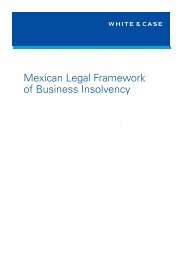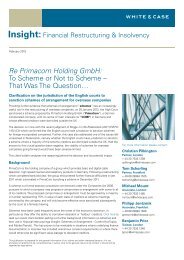Certain Broker-Dealers Deemed Not to Be ... - White & Case
Certain Broker-Dealers Deemed Not to Be ... - White & Case
Certain Broker-Dealers Deemed Not to Be ... - White & Case
Create successful ePaper yourself
Turn your PDF publications into a flip-book with our unique Google optimized e-Paper software.
This article originally appeared in slightly different form in the June 2005 issue of<br />
Banking & Financial Services Policy Report.<br />
<strong>Certain</strong> <strong>Broker</strong>-<strong>Dealers</strong><br />
<strong>Deemed</strong> <strong>Not</strong> <strong>to</strong> <strong>Be</strong><br />
Investment Advisers<br />
Kevin Keogh, Gregory Gnall, and Claudette Robertson Druehl<br />
<strong>White</strong> & <strong>Case</strong><br />
On April 12, 2005, the Securities and<br />
Exchange Commission (SEC) adopted<br />
Rule 202(a)(11)-1 under the Investment<br />
Advisers Act of 1940 (Advisers Act)<br />
under which certain broker-dealers may<br />
provide brokerage services for fee-based<br />
compensation without falling within the<br />
defi nition of an “investment adviser” and<br />
being subject <strong>to</strong> registration and other<br />
requirements under the Advisers Act. 1<br />
The proposed rule was the subject of<br />
numerous comment letters and was the<br />
subject of a suit brought by the Financial<br />
Planning Association. 2<br />
Under the Advisers Act, an “investment<br />
adviser” is a person who, for compensation,<br />
engages in the business of advising others,<br />
either directly or through publications<br />
or writings, as <strong>to</strong> the value of securities<br />
or as <strong>to</strong> the advisability of investing in,<br />
purchasing, or selling securities, or who<br />
for compensation or as a part of its regular<br />
business, issues or promulgates analyses or<br />
reports concerning securities. “Investment<br />
Adviser” does not include certain fi nancial<br />
institutions or professionals (banks, bank<br />
holding companies, lawyers, accountants,<br />
etc.) who are not holding themselves out<br />
<strong>to</strong> the public as investment advisers and<br />
whose provision of advisory services is<br />
merely incidental <strong>to</strong> the practice of their<br />
professions. Similarly, a broker or dealer is<br />
not deemed <strong>to</strong> be an investment adviser<br />
if the “performance of such services<br />
are solely incidental <strong>to</strong> the conduct of<br />
his business as a broker or dealer and<br />
[the broker-dealer] receives no special<br />
compensation therefor.” 3<br />
Traditionally, the divisions between<br />
incidental broker-dealer activities and<br />
investment advisory activities were fairly<br />
clear. In 1940, when the Advisers Act<br />
was enacted, broker-dealers provided<br />
varied and extensive “brokerage house<br />
advice” on a range of subjects, including<br />
corporations, municipalities, governments,<br />
general business and fi nancial conditions,<br />
and tax consequences of certain<br />
transactions. 4 The fi rms also provided<br />
research <strong>to</strong> their cus<strong>to</strong>mers as part of<br />
their regular advice. In addition, brokerage<br />
fi rms provided advice through “investment<br />
advisory departments” in which cus<strong>to</strong>mers<br />
were charged a distinct fee for advisory<br />
services. <strong>Broker</strong>age fi rms offered<br />
“advisory” accounts in which the broker<br />
would provide opinions about recommended<br />
holdings in the account and<br />
“discretionary” accounts in which the<br />
broker-dealer had control over the client’s<br />
funds with the ultimate authority <strong>to</strong><br />
determine which securities should be<br />
purchased and sold in the client’s<br />
portfolio. Those providing separate investment<br />
advice for compensation were<br />
ultimately defi ned as investment advisers<br />
Kevin Keogh<br />
Partner<br />
Gregory Gnall<br />
Partner<br />
Claudette Robertson Druehl<br />
Associate<br />
JUN 2006 | 01642 1
<strong>Certain</strong> <strong>Broker</strong>-<strong>Dealers</strong> <strong>Deemed</strong> <strong>Not</strong> <strong>to</strong> <strong>Be</strong> Investment Advisers<br />
under the Advisers Act and required <strong>to</strong> register;<br />
broker-dealers providing general advice ancillary <strong>to</strong><br />
the brokerage services and who continued <strong>to</strong> charge a<br />
transaction-based commission were excepted<br />
from the defi nition of investment adviser but still<br />
regulated under the Securities Exchange Act of 1934<br />
(Exchange Act). The SEC determined that the Advisers<br />
Act “was intended <strong>to</strong> cover broker-dealers only <strong>to</strong><br />
the extent that they were offering investment advice<br />
as a distinct service for which they were specially<br />
compensated.” 5<br />
After the elimination of fi xed commission rates in<br />
1975, the brokerage industry evolved <strong>to</strong> include both<br />
discount and full-service brokers and the eventual<br />
development of fee-based accounts. This latter<br />
practice was a consequence of the recognition of<br />
the inherent confl icts arising out of the payment<br />
of commissions <strong>to</strong> full-service brokers by the<br />
Committee on Compensation Practices (also known<br />
as the Tully Committee), which in 1995, identifi ed<br />
as a best practice compensating representatives<br />
based on account assets and not on a transactional<br />
basis. However, this practice has tended <strong>to</strong> blur<br />
the distinctions between brokerage and advisory<br />
activities and raised the issue of whether fee-based<br />
compensation amounted <strong>to</strong> “special compensation”<br />
under the Advisers Act. Rule 202(a)(11)-1 was<br />
pro posed, in part, <strong>to</strong> limit the uncertainty that<br />
broker-dealers faced in offering fee-based advice.<br />
The SEC believes that the “primary effect of the Rule<br />
202(a)(11)-1 will be <strong>to</strong> maintain the his<strong>to</strong>rical ability of<br />
full service broker-dealers <strong>to</strong> provide a wide variety<br />
of services, including advisory services, <strong>to</strong> brokerage<br />
cus<strong>to</strong>mers, without requiring those broker-dealers <strong>to</strong><br />
treat those clients as advisory clients.” 6<br />
Exception for Fee-Based <strong>Broker</strong>age Accounts<br />
Under Rule 202(a)(11)-1(a), a broker is not required <strong>to</strong><br />
treat its brokerage cus<strong>to</strong>mers as advisory clients solely<br />
because of the broker-dealer’s fee-based compensation.<br />
To rely on this exception, a broker-dealer registered<br />
under the Exchange Act must satisfy both of the<br />
following conditions: (1) Any investment advice must<br />
be solely incidental <strong>to</strong> that of the brokerage services<br />
provided <strong>to</strong> the account and must be provided on<br />
a non-discretionary basis, and (2) advertisements,<br />
contracts, agreements, and other account documentation<br />
must include a prominent statement that the<br />
account is a brokerage account and not an advisory<br />
account and that the broker’s interests may not be the<br />
same as the cus<strong>to</strong>mer’s. The prominent disclosure<br />
must identify a person at the fi rm with whom clients<br />
can discuss the differences between advisory and<br />
brokerage accounts.<br />
Solely Incidental <strong>to</strong> <strong>Broker</strong>age Services<br />
The broker-dealer may rely on this exception only if<br />
the advice provided <strong>to</strong> any account is solely incidental<br />
<strong>to</strong> brokerage services provided by the broker-dealer<br />
<strong>to</strong> that account and not <strong>to</strong> the overall operations of<br />
the broker-dealer. Accordingly, the advice that the<br />
broker-dealer provides must be non-discretionary<br />
advice. Discretionary accounts subject <strong>to</strong> an asset-based<br />
fee will be subject <strong>to</strong> the Advisers Act. These types<br />
of accounts are substantially similar <strong>to</strong> traditional<br />
advisory accounts, and the SEC staff believes that<br />
such accounts were within the scope of Congress’s<br />
legislative intent when enacting the Advisers Act<br />
in 1940.<br />
Cus<strong>to</strong>mer Disclosure<br />
Rule 202(a)(11)-1(a) provides that cus<strong>to</strong>mer account<br />
documents must emphasize the differences between<br />
a brokerage account and advisory account and that all<br />
cus<strong>to</strong>mer documents include the following statement in<br />
a prominent manner as provided in Rule 202(a)(11)-1(a).<br />
Your account is a brokerage account and not an<br />
advisory account. Our interests may not always<br />
be the same as yours. Please ask us questions<br />
<strong>to</strong> make sure you understand your rights and our<br />
obligations <strong>to</strong> you, including the extent of our<br />
obligations <strong>to</strong> disclose confl icts of interests and<br />
<strong>to</strong> act in your best interest. We are paid by you<br />
and, sometimes, by people who compensate us<br />
based on what you buy. Therefore, our profi ts,<br />
and our salespersons’ compensation, may vary<br />
by product and over time.<br />
Firms may make minor modifi cations <strong>to</strong> the required<br />
disclosure <strong>to</strong> fi t individual circumstances, but may<br />
2
<strong>Certain</strong> <strong>Broker</strong>-<strong>Dealers</strong> <strong>Deemed</strong> <strong>Not</strong> <strong>to</strong> <strong>Be</strong> Investment Advisers<br />
not materially alter the substance of the disclosure.<br />
In addition, the broker-dealer must identify the<br />
appropriate person with whom cus<strong>to</strong>mers can<br />
discuss the differences between the two types<br />
of accounts.<br />
Discount <strong>Broker</strong>age Programs<br />
Rule 202(a)(11)-1(a)(2) provides that a broker-dealer<br />
will not be considered <strong>to</strong> have received special<br />
compensation only because it charges different cus<strong>to</strong>mers<br />
different commissions, mark-ups, mark-downs,<br />
or similar fees. In the Adopting Release, the SEC<br />
staff states that this provision is intended <strong>to</strong> keep a<br />
full-service broker-dealer from being subject <strong>to</strong> the<br />
Advisers Act solely because it offers electronic or<br />
discount brokerage services. A discount broker will<br />
not be subject <strong>to</strong> the Advisers Act if it provides full<br />
service brokerage. 7<br />
Scope of Exception<br />
Rule 202(a)(11)-1(c) provides that a broker-dealer<br />
subject <strong>to</strong> the Advisers Act would be considered an<br />
investment adviser solely with respect <strong>to</strong> the accounts<br />
that subject it <strong>to</strong> the Advisers Act. This provision is<br />
in line with the SEC’s earlier interpretation of the<br />
Advisers Act allowing a broker-dealer registered<br />
under the Advisers Act <strong>to</strong> distinguish its brokerage<br />
cus<strong>to</strong>mers from its advisory clients.<br />
Solely Incidental To<br />
The exceptions from adviser registration in § 202(a)(11)(C)<br />
and new Rule 202(a)(11)-1 are available <strong>to</strong> broker-dealers<br />
only with respect <strong>to</strong> advice that is solely incidental <strong>to</strong><br />
the broker-dealer’s business or account, respectively.<br />
Examples of advice that would be incidental <strong>to</strong> the<br />
business or an account include advising clients <strong>to</strong><br />
enter or <strong>to</strong> stay out of the market in general or <strong>to</strong><br />
participate in or refrain from a specifi c transaction<br />
or providing generalized market reports. Similarly,<br />
the SEC staff states that investment advice is<br />
solely incidental <strong>to</strong> the conduct of a broker-dealer’s<br />
business and <strong>to</strong> brokerage services when the<br />
“advisory services rendered are in connection with<br />
and reasonably related <strong>to</strong> the brokerage services<br />
provided.” 8 In response <strong>to</strong> many comments regarding<br />
the meaning of “solely” and “incidental,” the SEC<br />
staff has identifi ed the following circumstances under<br />
which it believes the provision of advisory services<br />
by a broker-dealer would not be solely incidental<br />
<strong>to</strong> brokerage (and therefore would not fi t within<br />
the exception).<br />
Separate Contract or Fee<br />
Under the Advisers Act, a broker-dealer that<br />
separately contracts with a cus<strong>to</strong>mer for investment<br />
advisory services cannot be considered <strong>to</strong> be<br />
providing advice that is solely related <strong>to</strong> its brokerage<br />
advice. In the Adopting Release, the SEC staff states<br />
that advisory services are not solely incidental <strong>to</strong><br />
brokerage services when those services are provided<br />
for a separate fee, because the charging of a separate<br />
fee in itself recognizes that the advisory services are<br />
provided independently of the brokerage services. 9<br />
Financial Planning<br />
Under the new rule, a broker-dealer will not be<br />
considered <strong>to</strong> be providing advice solely incidental <strong>to</strong><br />
brokerage services if it provides advice as part of a<br />
fi nancial plan or in connection with providing planning<br />
services and (1) holds itself out generally <strong>to</strong> the<br />
public as a fi nancial planner or as providing fi nancial<br />
planning services, (2) delivers a fi nancial plan <strong>to</strong> its<br />
cus<strong>to</strong>mers, or (3) represents <strong>to</strong> the cus<strong>to</strong>mer that<br />
the advice is presented as part of a fi nancial plan or<br />
as fi nancial planning services. When a broker-dealer<br />
provides this type of fi nancial planning advice, if the<br />
broker-dealer also advertises, it must register as<br />
an adviser unless another exemption from the<br />
registration requirements is available. In addition, a<br />
broker-dealer must treat cus<strong>to</strong>mers receiving this<br />
type of fi nancial planning advice as advisory clients.<br />
The SEC received many comment letters regarding<br />
what type of advice provided in connection with<br />
fi nancial planning was not “solely incidental” <strong>to</strong><br />
brokerage advice. Instead of determining where<br />
a suitability analysis ends and fi nancial planning<br />
begins, the SEC staff determined that the test would<br />
3
<strong>Certain</strong> <strong>Broker</strong>-<strong>Dealers</strong> <strong>Deemed</strong> <strong>Not</strong> <strong>to</strong> <strong>Be</strong> Investment Advisers<br />
be the way in which a broker-dealer holds itself out<br />
<strong>to</strong> the public. Under the new rule, the broker-dealer is<br />
subject <strong>to</strong> the Advisers Act if it portrays itself <strong>to</strong> the<br />
public as a fi nancial planner or as providing fi nancial<br />
planning services, whether it uses these particular<br />
terms or not. Whether a document is considered<br />
a fi nancial plan or services considered fi nancial<br />
planning services will depend on the characteristics<br />
of the particular plan or services.<br />
Holding Out <strong>to</strong> the Public<br />
The new rule does not include any other limitations<br />
on how a broker-dealer may hold itself out, including<br />
use of the terms fi nancial adviser or fi nancial<br />
consultant, in order <strong>to</strong> fi t within the exception under<br />
the Advisers Act. The SEC staff concludes that a<br />
better approach is <strong>to</strong> require broker-dealers <strong>to</strong> inform<br />
clients clearly that the relationship is a brokerage and<br />
not advisory relationship, as addressed in the required<br />
disclosure. Accordingly, broker-dealers may use the<br />
terms fi nancial advisors or fi nancial consultants or<br />
similar names and not be required <strong>to</strong> register as an<br />
investment adviser, so long as the other conditions<br />
of the rule have been met.<br />
Discretionary Asset Management<br />
Discretionary investment advice is not “solely<br />
incidental <strong>to</strong>” brokerage services within the meaning<br />
of the new rule under § 202(a)(11)(C) of the Advisers<br />
Act. <strong>Broker</strong>-dealers will not be excepted from the<br />
Advisers Act for any accounts over which they<br />
exercise investment discretion regardless of whether<br />
the broker-dealer is receiving special compensation<br />
for the investment advice and regardless of how<br />
the broker-dealer handles other accounts. The SEC<br />
is following the same interpretation of “investment<br />
discretion” currently applicable <strong>to</strong> broker-dealers<br />
under the Exchange Act. 10<br />
The new rule is a change from the existing SEC<br />
approach in this area. Under the new rule, the<br />
exception from adviser registration is not available<br />
for any account over which the broker-dealer has<br />
any investment discretion regardless of the form<br />
of compensation or how the broker-dealer handles<br />
other accounts. However, the SEC recognizes the<br />
need for some exceptions from strictly following<br />
§ 3(a)(35) of the Exchange Act; a broker-dealer may<br />
exercise investment discretion on a temporary or<br />
limited basis and still be eligible for the exception in<br />
the following types of circumstances:<br />
■ As <strong>to</strong> the price or time at which <strong>to</strong> execute an order<br />
given by a cus<strong>to</strong>mer for the purchase or sale of a<br />
defi nite amount or quantity of a specifi ed security;<br />
■ On an isolated or infrequent basis <strong>to</strong> purchase or<br />
sell a security or type of security when a cus<strong>to</strong>mer<br />
is unavailable for a limited period of time not <strong>to</strong><br />
exceed a few months (for example, a cus<strong>to</strong>mer<br />
may be on vacation and provide specifi c<br />
instructions as <strong>to</strong> the handling of the account<br />
during this time);<br />
■ As <strong>to</strong> cash management, such as <strong>to</strong> exchange a<br />
position in a money market fund for another money<br />
market fund or cash equivalent;<br />
■ To purchase or sell securities <strong>to</strong> satisfy margin<br />
requirements;<br />
■ To sell specifi c bonds and purchase similar bonds<br />
in order <strong>to</strong> permit a cus<strong>to</strong>mer <strong>to</strong> take a tax loss on<br />
the original position;<br />
■ To purchase a bond with a specifi ed credit rating<br />
and maturity; and<br />
■ To purchase or sell a security or type of security<br />
limited by specifi c parameters established by the<br />
cus<strong>to</strong>mer (type of issuer, amount, maturity, and<br />
yield must be specifi ed by the cus<strong>to</strong>mer).<br />
Wrap-Fee Sponsorship<br />
In the Adopting Release, the SEC staff reaffi rms its<br />
traditional position that portfolio manager selection<br />
and asset allocation services by broker-dealers<br />
involved in wrap-fee programs are advisory services<br />
that are not solely incidental <strong>to</strong> brokerage services.<br />
<strong>Broker</strong>-dealers involved as such in wrap-fee programs<br />
will not be excepted from adviser registration.<br />
4
<strong>Certain</strong> <strong>Broker</strong>-<strong>Dealers</strong> <strong>Deemed</strong> <strong>Not</strong> <strong>to</strong> <strong>Be</strong> Investment Advisers<br />
Open Issues<br />
The adoption of the new rule leaves many questions<br />
unanswered. The Chairman of the SEC has directed<br />
the SEC staff <strong>to</strong> report within 90 days on ways in which<br />
the open issues may be addressed. The SEC staff is<br />
also <strong>to</strong> report on options and recommendations for<br />
a study <strong>to</strong> compare the different levels of protection<br />
for retail cus<strong>to</strong>mers of fi nancial service providers<br />
under the Exchange Act and Advisers Act, and <strong>to</strong><br />
recommend ways <strong>to</strong> address inves<strong>to</strong>r protection<br />
concerns arising from material differences between<br />
the two sets of regulations. The scope of the study<br />
would include the following areas:<br />
■ Should the SEC seek legislation that would integrate<br />
the existing regula<strong>to</strong>ry schemes applicable <strong>to</strong><br />
broker-dealers and investment advisers that provide<br />
services <strong>to</strong> retail clients?<br />
■ Should sales practice standards and advertising<br />
rules applicable <strong>to</strong> advice provided by broker-dealers<br />
be enhanced?<br />
■ Should broker-dealers who provide investment<br />
advice but who are excepted from the Advisers<br />
Act be subject <strong>to</strong> the fi duciary obligations imposed<br />
by the Advisers Act on investment advisers?<br />
■ Should obligations under the Advisers Act applicable<br />
<strong>to</strong> dually registered broker-dealers be modifi ed or<br />
streamlined <strong>to</strong> eliminate regula<strong>to</strong>ry overlap and<br />
reduce regula<strong>to</strong>ry burdens?<br />
■ Are there areas that the SEC, alone or with other<br />
agencies, can engage in inves<strong>to</strong>r education efforts <strong>to</strong><br />
assist inves<strong>to</strong>rs <strong>to</strong> better understand the duties and<br />
obligations of their fi nancial services providers?<br />
Effective Dates<br />
The new rule became effective April 15, 2005. The<br />
provision of the rule regarding the prominent disclosure<br />
(Rule 202(a)(11)-1(a)(1)(ii)) is effective May 23, 2005.<br />
<strong>Broker</strong>-dealers relying on Rule 202(a)(11)-1(a)(1) must<br />
comply with the disclosure provisions beginning on<br />
July 22, 2005.<br />
All advertisements for contracts, agreements,<br />
applications, and other forms governing accounts<br />
opened after July 22, 2005, must include the<br />
prominent disclosure. <strong>Broker</strong>s are not required <strong>to</strong><br />
amend existing contracts <strong>to</strong> include the disclosure<br />
for accounts opened prior <strong>to</strong> July 22, 2005.<br />
<strong>Broker</strong>-dealers relying on Rule 202(a)(11)-1(b)(3)<br />
regarding exercise of investment discretion that is not<br />
“solely incidental” <strong>to</strong> brokerage services must treat<br />
commission-based accounts as advisory accounts<br />
no later than Oc<strong>to</strong>ber 24, 2005. <strong>Broker</strong>-dealers must<br />
treat accounts <strong>to</strong> which it provides advisory services<br />
pursuant <strong>to</strong> Rule 202(a)(11)-1(b)(1) and (2) as advisory<br />
accounts no later than Oc<strong>to</strong>ber 24, 2005.<br />
The application of the new Rule may create interesting<br />
challenges for broker-dealers who traditionally were<br />
able <strong>to</strong> rely on the exception from investment adviser<br />
registration, particularly where a broker-dealer which<br />
acts with discretion receives only transaction-related<br />
compensation.<br />
Kevin Keogh is a partner in <strong>White</strong> & <strong>Case</strong>’s<br />
New York Securities Practice Group. Mr. Keogh’s<br />
practice involves securities transactions, acquisitions,<br />
divestitures, joint ventures, corporate counseling and<br />
strategic advice. Gregory Gnall is counsel in<br />
<strong>White</strong> & <strong>Case</strong>’s Securities Practice Group in New York.<br />
Mr. Gnall is involved in establishing broker-dealers,<br />
overseeing their registration with the SEC and applying<br />
for membership with NASD and the NYSE. He also<br />
creates broker-dealer supervisory and operational<br />
procedures. Claudette Robertson Druehl is an<br />
associate in <strong>White</strong> & <strong>Case</strong>’s Securities Practice Group,<br />
concentrating on state securities laws and<br />
broker-dealer and investment adviser regulation.<br />
The information in this article is for educational<br />
purposes only; it should not be construed as<br />
legal advice.<br />
Copyright © 2006 <strong>White</strong> & <strong>Case</strong> LLP<br />
5
<strong>Certain</strong> <strong>Broker</strong>-<strong>Dealers</strong> <strong>Deemed</strong> <strong>Not</strong> <strong>to</strong> <strong>Be</strong> Investment Advisers<br />
1 See 17 C.F.R. Part 275, Release Nos. 34-51523, IA-2376, File No.<br />
S7-25-99, 70 FR 20424 (Adopting Release). The rule was initially<br />
proposed in 1999 (Release Nos. 34-42099, IA-1845 File No. S7-25-<br />
99, 64 FR 61226 (Nov. 10, 1999)) and re-proposed in January 2005<br />
(see Release Nos. 34-50980, IA-2340, File No. S7-25-99, 70 FR<br />
2716 (Jan. 14, 2005)).<br />
2 See Financial Planning Ass’n v. Securities and Exchange<br />
Commission, No. 04-1242 (D.C. Cir., fi led July 20, 2004). The suit<br />
claimed that the SEC’s failure <strong>to</strong> adopt a fi nal rule and its reliance<br />
on an embedded no-action position <strong>to</strong> except certain brokerdealers<br />
from falling within the Advisers Act violated the Advisers<br />
Act and the Administrative Procedure Act and was “arbitrary<br />
and capricious.” The action was stayed pending reproposal and<br />
adoption of the rule.<br />
3 Advisers Act § 202(a)(11).<br />
4 See Adopting Release at 19.<br />
5 See Adopting Release at 25.<br />
6 See Adopting Release at 31.<br />
7 Adopting Release at 45.<br />
8 Adopting Release at 47.<br />
9 Adopting Release at 52.<br />
10 A person exercises “investment discretion” with respect <strong>to</strong><br />
an account pursuant <strong>to</strong> § 3(a)(35) of the Exchange Act if the<br />
person (1) is authorized <strong>to</strong> determine which securities or other<br />
property shall be purchased or sold by or for the account, (2)<br />
makes decisions as <strong>to</strong> what securities or other property shall be<br />
purchased or sold by or for the account even though some other<br />
person may have responsibility for such investment decisions, or<br />
(3) otherwise exercises infl uence with respect <strong>to</strong> the purchase<br />
or sale of securities or other property by or for the account as the<br />
SEC determines should be subject <strong>to</strong> the Exchange Act.<br />
6
















